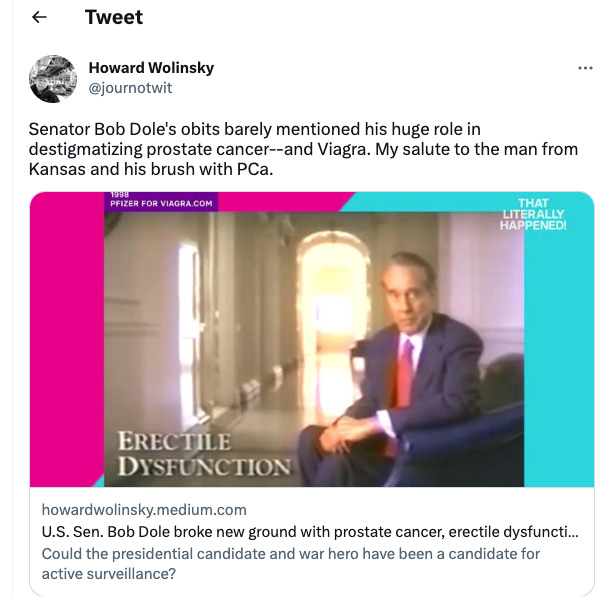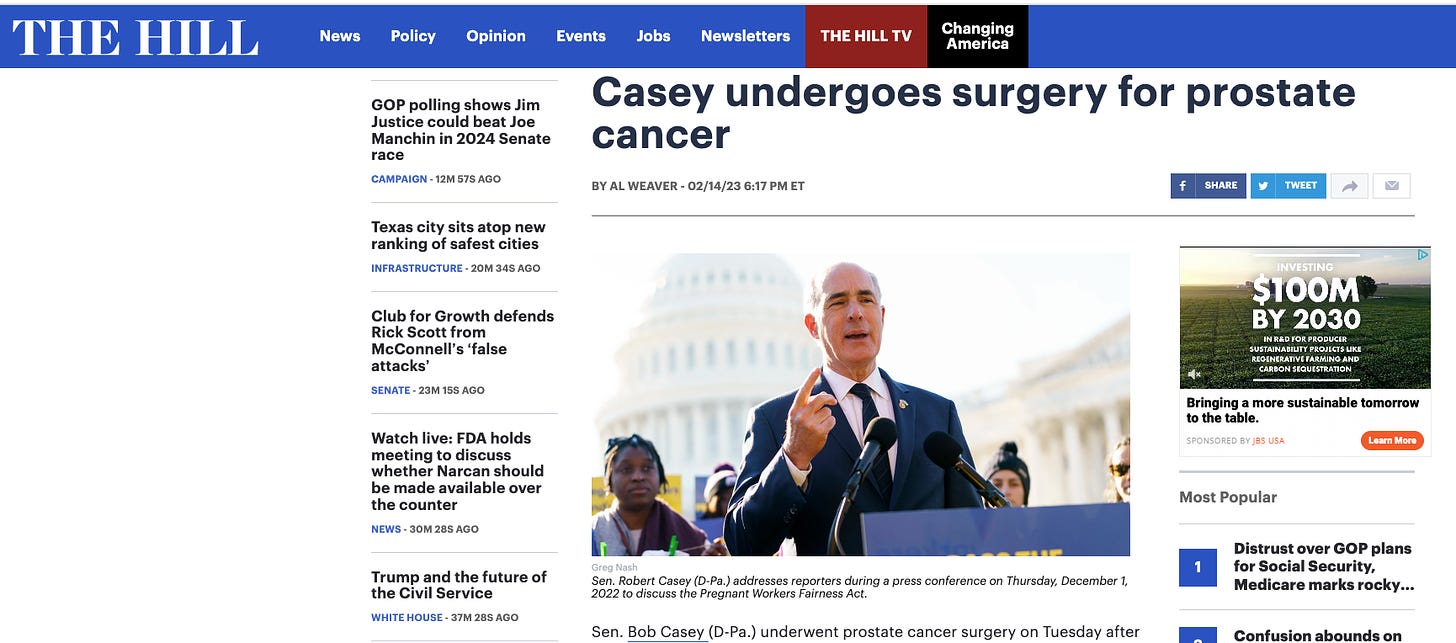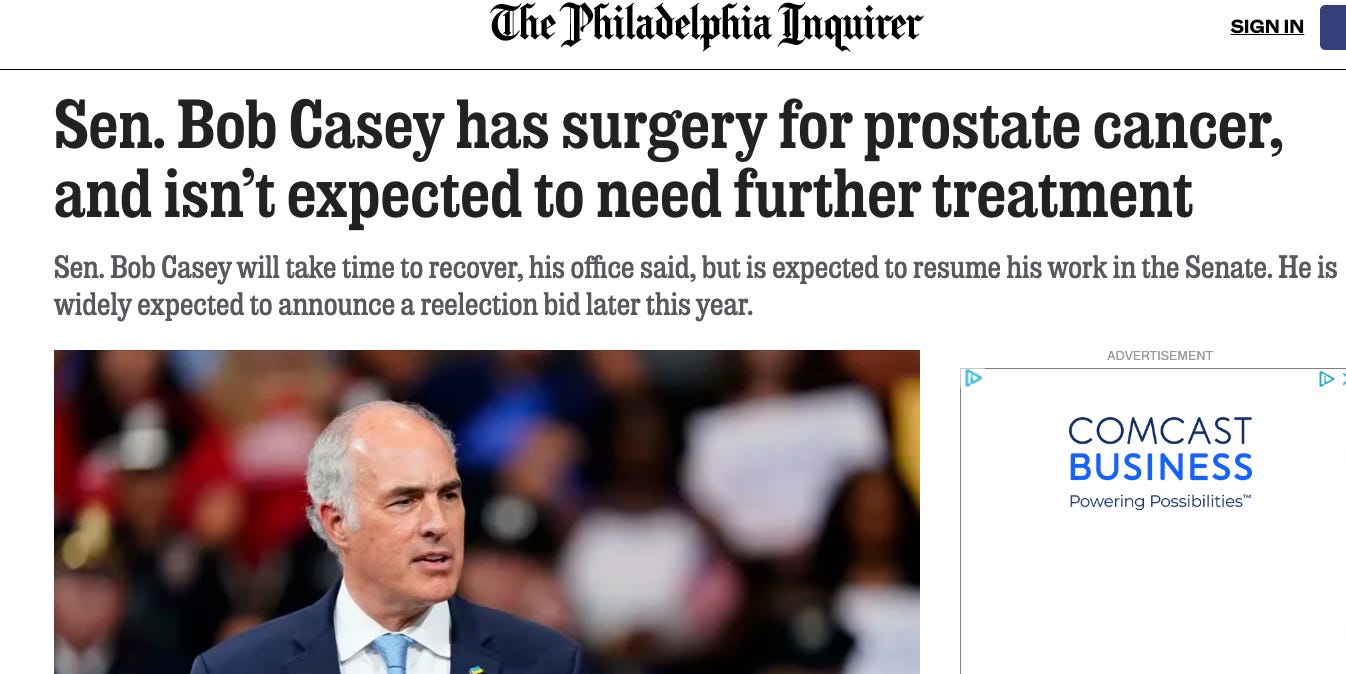A cancer on the Senate--and the political media
Politics and prostate cancer, strange bedfellows
By Howard Wolinsky
White House counsel John Dean on March 21, 1973, warned President Richard M. Nixon there was a “cancer growing on his presidency.” This would lead eventually to Nixon’s resignation in October 1974.
That was cancer as a metaphor.
But a real cancer has been growing on the U.S. Senate for years—prostate cancer.
This has been true for ages … since ancient Roman times. It comes with the territory.
The word Senate is derived from the Latin word senex, meaning "old man." The Senate in ancient Rome was a council of elders.
American mens need only be 30 to qualify as U.S. Senators. But the U.S. Senate remains a sort of council of elders.
The average age of U.S. Senators is 64.3, which coincides with the average age for men diagnosed with prostate cancer, about 66.
The Senate floor must be littered with lawgivers who have undiagnosed prostate cancer that will never kill them.
The most famous prostate cancer patient likely was Kansas Senator Bob Dole. He put prostate cancer, erectile disorder, and Viagra on the political and cultural map.
Dole was 68 when he was diagnosed with prostate cancer in 1991 and underwent a radical prostatectomy.
He opened the doors for other cancer “survivors” to seek the highest office in the land. His prostate cancer didn’t stop the Republican’s unsuccessful run for president in 1996 against Bill Clinton.
In 1998, the droll Dole made a big splash with his ads for Viagra and ED. Ironically, most of his obituaries mentioned Dole had died from lung cancer but overlooked his prostate cancer.
Dole became a standard-bearer for patients with prostate cancer, the second most deadly cancer in men, though several of his Senate colleagues and then U.S. Supreme Court Chief John Paul Stevens all had prostate cancer.
Dole became a symbol for prostate cancer just as Betty Ford, the wife of President Gerald Ford, did for breast cancer in 1974.
It seems likely that Dole had low-risk prostate cancer—the odds go in that direction—but active surveillance wasn’t a thing in the early 1990s.
In any case, Dole blazed a trail and somewhat reduced the stigma of prostate cancer and erectile disorder.
Weeks after he was diagnosed with prostate cancer, on May 2, 2019, Democratic Colorado Senator Bennet, then in his early 50s, announced his candidacy for the Democratic nomination for president of the United States. He quit nine months later when he didn’t gain traction.
Bennet Spokesperson Statement on Senator’s Successful Surgery for Prostate Cancer
April 19, 2019
Washington, D.C. – Today, Courtney Gidner, a spokesperson for Colorado U.S. Senator Michael Bennet, issued the following statement:
“Last weekend, Michael underwent surgery and is recovering at his home in Colorado. His doctors report the surgery was completely successful and he requires no further treatment. Michael and his family deeply appreciate the well wishes and support from Coloradans and others across the country, and he looks forward to returning to work after the recess.”
I contacted his press secretary back then to try to determine the facts of his cancer. I wondered if he had a low-risk cancer that could have been managed with AS. I received no response.
You can argue that politicians are entitled, like everyone else, to privacy on health matters.
But I don’t buy that. I think politicians holding high office or running for it ought to be transparent about health issues that may impact their performance in office.
We saw a great ongoing example involving Pennsylvania’s Jr. Senator John Fetterman, who experienced communications issues caused by a stroke while campaigning for the U.S. Senate in 2022. His opponent Dr. Mehmet Oz, a TV personality and a cardiothoracic surgeon, harped on it as an issue. But Fetterman couldn’t ignore it either as it affected his debate performance. Oz lost anyway.
Media eyes remain on Fetterman and they will as long as he is in office. As the New York Times said: “Mr. Fetterman, 53, the 6-foot-8, tattooed and goateed Democrat from Pennsylvania who suffered a near-fatal stroke last May and went on to win one of the most competitive seats in November’s midterm elections, was never going to blend in seamlessly in the marbled corridors of Congress.”
On Feb. 8, Fetterman was hospitalized after feeling lightheaded while attending a daylong Senate Democratic retreat in Washington. Initial tests showed no sign of another stroke, but he spent two days in the hospital while doctors ran additional tests and monitored him for seizures, according to a spokesman.
On Feb. 16, he was hospitalized for clinical depression. Eyes will never be taken off him until he leaves the government.
On Valentine’s Day, Pennsylvania Sr. Democratic Senator Bob Casey made front-page news when he underwent a prostatectomy.
Casey, 62, underwent what his office described as a "successful" surgery for prostate cancer Tuesday. His office said the Pennsylvania Democrat shouldn't require further treatment.
“This afternoon (Feb. 14), Senator Casey underwent scheduled surgery for prostate cancer," Casey spokesperson Mairéad Lynn said in a statement. "His doctor reports that, as expected, the procedure went well and he confirmed that the senator should not require further treatment. Senator Casey and his family appreciate the well-wishes and extraordinary support from every corner of the Commonwealth, and he looks forward to getting back to a normal schedule after a period of rest and recovery."
Good news, right? Who knows? It was the usual pablum press secretaries dispense to distract reporters and the public. It’s the tail that wags the dog.
Meanwhile, Casey won’t get the media scrutiny his colleague Fetterman is getting.
Everything is hunky-dory for Casey. Apparently.
The media, often like lambs in these health-political stories, follow what is dished out to them by the politicians’ press secretaries—hacks paid to tell a mix of truths, half-truths, and worse on behalf of their political masters.
Still, I had questions about Casey, who has served in the U.S. Senate since 2007 and is up for re-election in 2024.
I wrote to Casey’s office in January about the specifics of Casey’s case, asking:
—What is his prostate-specific antigen (PSA) blood level?
—What is his PI-RADS score for his MRI?
—What is his Gleason score?
I also asked for an interview with Casey. What did I have to lose? No answer.
Virtually anyone acquainted with prostate cancer would want to know answers to those questions to determine the severity of his case and whether treatment is in order.
The majority of patients diagnosed with prostate cancer (55%) have low-risk (Gleason 6) to favorable intermediate-risk (Gleason 3+4) cancers. That means they would qualify for Active Surveillance, close monitoring, and avoid risks from radical prostatectomies and radiation therapy, such as incontinence and impotence. But 40% of these patients in the U.S. still undergo treatment, according to the American Urological Association.
A very small percentage of these patients have metastatic disease that is an immediate threat. The remainder falls in between.
I wrote again to Casey’s press secretary. I didn’t expect an answer, but I gave it a try.
Do Senators get a special kind of cancer that requires aggressive treatment? The same holds true for old rockers, singers, actors, and other celebs?
Not likely. Yet stories in major media about their prostate cancers say the cancer was caught early, they underwent treatment and will make a quick recovery. It’s the usual.
I am always skeptical about such reports. I think high-profile pols may be rejecting AS because they are protecting their political careers and their constituents would find the idea of AS, living with an untreated cancer, hard to accept.
There have been cases in history where the personal health of presidents was hidden from the public to protect their political health.
Like when Edith Wilson became the “secret president” and was informed on all matters of state after her husband President Woodrow Wilson was sidelined permanently by a stroke. Mrs. Wilson was First Lady and First Acting President from September 1919 through 1921. Wilson had intended to seek a third term.
Or when President Grover Cleveland had secret surgery for oral cancer on a yacht on the Potomac in 1893 as he started his second term and America was headed into a recession.
Do you think the health of officials should be kept secret?
Then, there is a metaphoric cancer on the media. They don’t know what questions to ask, don’t have the time or interest to ask them, or simply are lazy.
The reporting on Casey on the TV networks and major newspapers, such as the New York Times and Washington Post, quickly disposed of Casey’s health issues, not asking the right questions, dragging poor Fetterman into the equation, and discussing the politics, not much about the cancer. We don’t even know where Casey underwent surgery.
I suggested follow-up stories about whether Casey might have been overtreated to the reporters at the Post, the Times, and the Philadelphia Inquirer.
Reporters covering these stories typically are on beats such as “breaking political news,” or simply political news. In my opinion, they’re missing some important stories that impact public health and also politics, the rock candy to which they are addicted.
Story ideas coming from an old fart like me with low-risk prostate cancer, who is still reporting on health after 50 years of banging on keyboards, are probably not welcome.
Health reporters these days, it seems, don’t often get called on to cover these stories, a disserve to media audiences, who would befit from hearing the story behind the story.
As the medical editor/reporter on the Chicago Sun-Times, I regularly got called on to cover such stories as Bulls’ Michael Jordan’s foot infection (more serious than it sounds), Bear’s punky QB Jim McMahon and his nasty chewing tobacco habit, along with medical aspects of the assassination attempt on President Reagan (my first story for the paper in March 1981), and Angelina Jolie’s prophylactic double mastectomy.
Media today may not have the time, but I think it would inform their readers about issues that affect pols as well as regular civilians. What do you think?
Last summer, I wrote a critique on media coverage of prostate cancer, which generally sucks, sometimes doesn’t, and I offered some tips to other scribes to help them unsuck.
Anybody listening?





Thanks for the kind words, Steve. You have future vision. I finished writing two articles this am on the insurance industry. You have a great memory. Howard
Thanks, Bill M. for catching my error. I am so stuck in the 21st Century that I dragged poor President Wilson along with me. He ended his term in 1921.